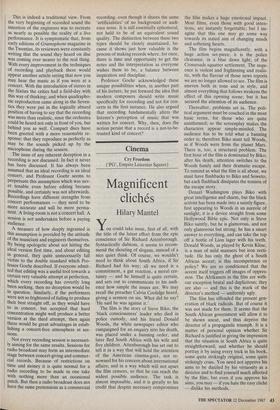Cinema
Cry Freedom (`PG', Empire Leicester Square)
Magnificent clichés
Hilary Mantel
You could take issue, first of all, with the title of the latest effort from the epic conscience of Sir Richard Attenborough. Syntactically dubious, it seems to recom- mend the shouting of slogans, instead of a nice quiet think. Of course, we wouldn't need to think about South Africa, if Sir Richard had his way; all we need is a commitment, a gut reaction, a moral cer- tainty — and he himself is quite certain, and sets out to communicate to his audi- ence how simple the issues are. We may recall the preacher Calvin Coolidge heard, giving a sermon on sin. What did he say? `He said he was against it.'
The film is the story of Steve Biko, the `black consciousness' leader who died in police custody, and his friend Donald Woods, the white newspaper editor who campaigned for an enquiry into his death, was placed under a banning order, and later fled South Africa with his wife and five children. Attenborough has set out to tell it in a way that will hold the attention of the American cinema-goer, not re- nowned for his concern about international affairs; and in a way which will not upset the film censors, so that he can reach the widest possible audience. The task is almost impossible, and it is greatly to his credit that despite necessary compromises the film makes a huge emotional impact. Most films, even those with good inten- tions, are instantly forgettable; but I im- agine that this one may go some way towards its stated aim of changing minds and softening hearts.
The film begins magnificently, with a huge action set-piece; it is the police clearance, in a blue dawn light, of the Crossroads squatter settlement. The sequ- ence is violent and frightening and realis- tic, with the flavour of those news reports we are no longer allowed to see. The film is uneven both in tone and in style, and almost everything that follows weakens the effect of this opening scene; but it has secured the attention of its audience.
Thereafter, problems set in. The poli- tical argument must be couched in the most basic terms, for those who are quite uninformed; so the screenplay makes the characters appear simple-minded. The audience has to be told what a banning order is; therefore Biko must tell Woods, as if Woods were from the planet Mars. There is, too, a structural problem. The first hour of the film is dominated by Biko; after his death, attention switches to the Woods family and their dramatic escape. To remind us what the film is all about, we must have flashbacks to Biko and Soweto; but each flashback dissipates the tension of the escape story.
Denzel Washington plays Biko with great intelligence and charm, but the black activist has been made into a saintly figure, first appearing to Woods in an aureole of sunlight; it is a device straight from some Hollywood Bible epic. Not only is Steve Biko saintly, but he is glamorous, and not only glamorous but strong; he has a smart answer to everything, and can take the top off a bottle of Lion lager with his teeth. Donald Woods, as played by Kevin Kline, is a man of mild manners but iron recti- tude. He has only the ghost of a South African accent; is this incompetence or policy? We are so conditioned that the accent itself triggers off images of oppres- sion. The Afrikaners in the film are with- out exception brutal and duplicitous; they are also — and this is the mark of the director's method — uniformly ugly.
The film has offended the present gen- eration of black radicals. But of course it was not made for them. It seems that the South African government will allow it to be shown uncut, and thus deprive the director of a propaganda triumph. It is a matter of personal opinion whether Sir Richard is justified in giving the impression that the situation in South Africa is quite straightforward; and whether he should portray it by using every trick in his book, some quite strikingly original, some quite strikingly crass. You need not approve his aims to be dazzled by his virtuosity as a director and to find yourself much affected by the film; but even if you approve his aims, you may — if you hate the easy cliché — dislike his methods.


























































 Previous page
Previous page